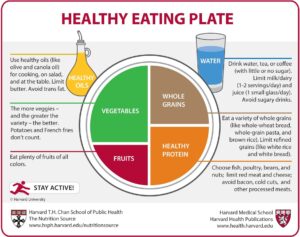Hey there! Are you curious about the fundamentals of a balanced diet? You’re in luck! In this article, we’ll explore what exactly makes up a balanced diet and why it’s important for your overall health and well-being.
Now, I know you might be wondering what exactly constitutes a balanced diet and why it’s so important. Well, you’re about to find out! We’ll dive into the various food groups and nutrients that should be included in your daily meals, as well as the benefits that come with maintaining a balanced diet. Whether you’re looking to improve your energy levels, maintain a healthy weight, or simply feel your best, understanding the fundamentals of a balanced diet is key. So, stay tuned and get ready to learn all about it in our upcoming article!
Why is a balanced diet important?
The significance of a balanced diet
A balanced diet is important because it provides the necessary nutrients, vitamins, and minerals that your body needs to function properly. It ensures that you are getting the right amount of energy and nutrients to maintain good health and well-being.
By eating a wide variety of foods from different food groups, you can ensure that your body receives all the essential nutrients it requires. A balanced diet also helps prevent nutrient deficiencies and reduces the risk of developing chronic diseases such as obesity, diabetes, and heart disease.
How a balanced diet impacts overall health and well-being
A balanced diet has a significant impact on your overall health and well-being. When you consume a variety of foods from different food groups, you provide your body with the necessary nutrients to support essential bodily functions, boost your immune system, and maintain optimal health.
A balanced diet can also help you maintain a healthy weight. By including the right balance of macronutrients, such as carbohydrates, proteins, and healthy fats, in your diet, you can manage your weight effectively and prevent weight-related health issues.
Furthermore, a balanced diet can improve your mental health. Nutrients from a balanced diet, such as omega-3 fatty acids, vitamins B6 and B12, and folate, are essential for brain health and can help reduce the risk of mental health disorders like depression and anxiety.
What are the components of a balanced diet?
Understanding macronutrients
Macronutrients are the nutrients that provide energy in the form of calories. They include carbohydrates, proteins, and fats. Each macronutrient serves a specific function in the body and should be consumed in the right proportions for a balanced diet.
The role of carbohydrates
Carbohydrates are the body’s primary source of energy. They provide fuel for physical activity, brain function, and other bodily processes. The main sources of carbohydrates are grains, fruits, vegetables, and legumes. It is essential to choose complex carbohydrates, such as whole grains and vegetables, over refined carbohydrates like white bread and sugary snacks, as complex carbohydrates provide more fiber and nutrients.
The importance of proteins
Proteins are essential for the growth, repair, and maintenance of body tissues, including muscles, organs, and skin. They are also involved in the production of enzymes, hormones, and antibodies. Good sources of proteins include lean meats, poultry, fish, eggs, dairy products, legumes, and nuts. To ensure a balanced diet, aim for a variety of protein sources and include both animal and plant-based options.
The benefits of healthy fats
Contrary to popular belief, fats are an essential part of a balanced diet. They provide energy, support cell growth, protect organs, and help the body absorb fat-soluble vitamins. Healthy fats, such as monounsaturated and polyunsaturated fats found in olive oil, avocados, nuts, and fatty fish, also help reduce the risk of heart disease. It is important to limit the consumption of saturated fats and avoid trans fats, as they can increase the risk of heart disease.
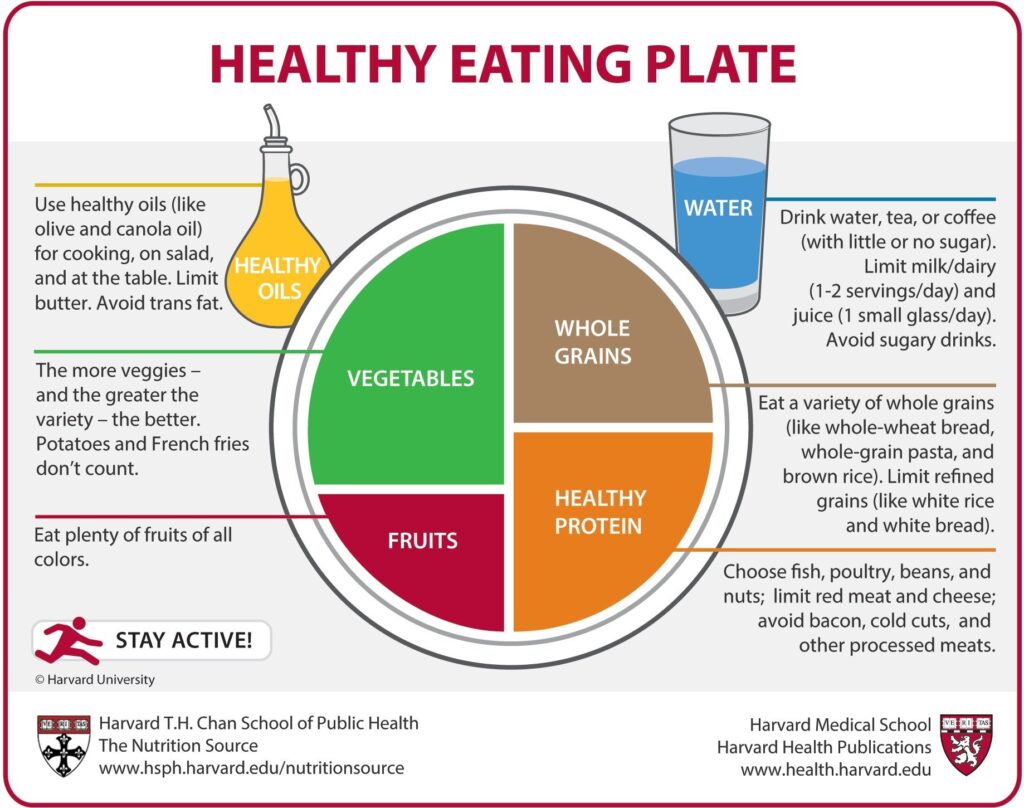
This image is property of www.hsph.harvard.edu.
How to incorporate fruits and vegetables into your diet?
The health benefits of fruits and vegetables
Fruits and vegetables are packed with essential vitamins, minerals, antioxidants, and fiber, making them crucial components of a balanced diet. They provide numerous health benefits, including reducing the risk of chronic diseases, promoting good digestion, supporting a healthy immune system, and maintaining healthy skin.
Tips for including more fruits and vegetables in your meals
To incorporate more fruits and vegetables into your diet, you can:
- Include a variety of colorful fruits and vegetables in your meals and snacks.
- Choose whole fruits over juices to get the full benefits of fiber.
- Add vegetables to your dishes, such as salads, soups, stir-fries, and sandwiches.
- Experiment with different cooking methods, such as steaming, roasting, or grilling, to enhance the flavors of vegetables.
- Keep a stock of frozen fruits and vegetables for convenience and use them when fresh ones are not available.
The role of vitamins and minerals in a balanced diet
The importance of vitamins
Vitamins are organic compounds that are essential for numerous bodily functions. They play a key role in metabolism, growth, immune function, and the maintenance of overall health. There are two types of vitamins: water-soluble vitamins (B vitamins and vitamin C) and fat-soluble vitamins (vitamins A, D, E, and K).
To ensure you get enough vitamins, you should aim to consume a variety of fruits, vegetables, whole grains, lean meats, dairy products, and legumes. If you have specific dietary restrictions or conditions, consult with a healthcare professional or registered dietitian to determine if you need any vitamin supplements.
The significance of minerals
Minerals are inorganic substances that are necessary for proper bodily function. They play a crucial role in bone health, fluid balance, nerve function, and muscle contraction. Examples of essential minerals include calcium, iron, magnesium, potassium, and zinc.
To meet your body’s mineral needs, include a variety of foods in your diet, such as dairy products, leafy green vegetables, whole grains, nuts, seeds, lean meats, and seafood. In some cases, mineral supplements may be recommended, especially for individuals with specific deficiencies or medical conditions.
How to ensure you get enough vitamins and minerals
A balanced diet that includes a variety of foods from all food groups can help you meet your vitamin and mineral needs. However, if you have specific dietary restrictions or conditions that may affect your nutrient absorption or requirements, it is advisable to consult with a healthcare professional or registered dietitian. They can provide personalized recommendations and, if necessary, suggest appropriate vitamin or mineral supplements.
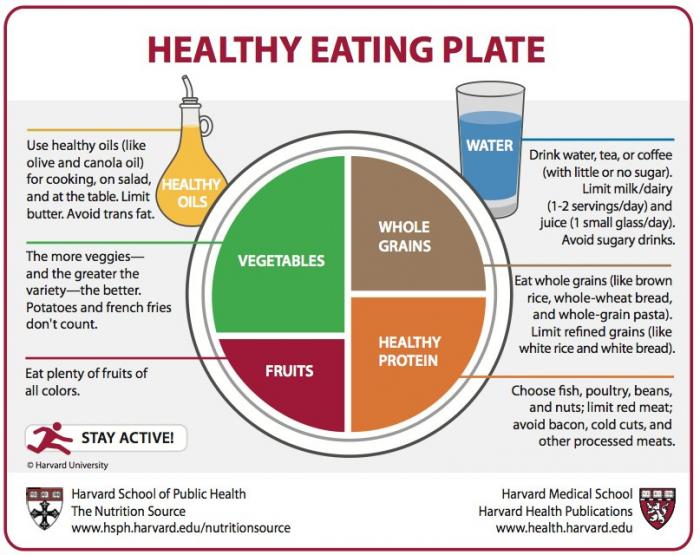
This image is property of www.e-education.psu.edu.
Understanding portion control and calorie intake
The relationship between portion control and weight management
Portion control is crucial for maintaining a healthy weight. By understanding serving sizes and portion control, you can ensure that you are consuming an appropriate amount of calories for your body’s needs. Overeating can lead to weight gain, while consistently eating too few calories can result in nutrient deficiencies and decreased energy levels.
Determining your calorie needs
Your calorie needs depend on various factors, including age, gender, activity level, and metabolic rate. To maintain a balanced diet, it is important to understand your calorie needs and ensure that you are consuming the right amount of calories from each macronutrient.
Strategies for maintaining a healthy calorie intake
To maintain a healthy calorie intake, you can:
- Be mindful of portion sizes by using smaller plates and bowls.
- Listen to your body’s hunger and fullness cues and stop eating when you are satisfied, not overly full.
- Plan and prepare meals in advance to help control portion sizes and make healthier food choices.
- Read food labels to understand serving sizes and nutrient content.
- Include a balance of macronutrients in your meals to ensure sustained energy and satisfaction.
- Limit the consumption of high-calorie, low-nutrient foods, such as sugary drinks, processed snacks, and desserts.
The role of water in a balanced diet
The importance of staying hydrated
Water is essential for maintaining proper bodily functions. It regulates body temperature, aids digestion, transports nutrients, and helps flush out waste products. Staying hydrated is crucial for overall health and well-being.
How much water should you drink each day?
The amount of water you need to drink each day varies based on factors such as age, gender, climate, physical activity level, and overall health. As a general guideline, aim to drink at least 8 glasses (64 ounces) of water per day. However, your individual needs may be higher or lower depending on your circumstances.
Tips for increasing water consumption
To increase your water consumption, you can:
- Carry a reusable water bottle with you throughout the day and sip on it regularly.
- Set reminders to drink water, especially if you tend to forget.
- Flavor your water with fresh fruits, herbs, or cucumber slices for added taste.
- Drink water before, during, and after exercise to stay hydrated.
- Monitor the color of your urine; pale or light yellow urine usually indicates adequate hydration.
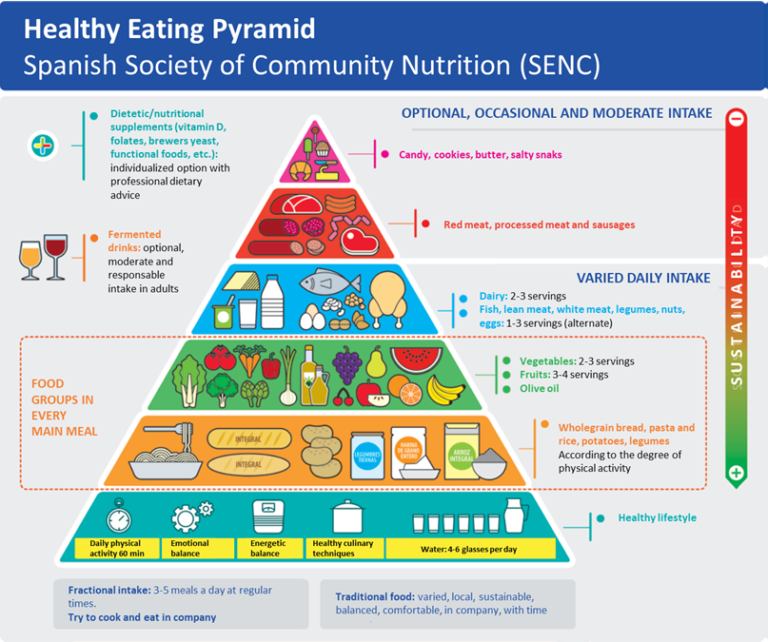
This image is property of cdn-wordpress-info.futurelearn.com.
The impact of processed foods on a balanced diet
Understanding the potential risks of processed foods
Processed foods are often high in added sugars, unhealthy fats, and sodium, and they tend to be low in nutrients. Regular consumption of processed foods can lead to weight gain, nutrient deficiencies, increased risk of chronic diseases, and poor overall health.
How to limit your intake of processed foods
To limit your intake of processed foods, you can:
- Cook meals at home using fresh and whole ingredients whenever possible.
- Read food labels and choose products with minimal added sugars, unhealthy fats, and sodium.
- Opt for whole grains instead of refined grains.
- Limit your intake of sugary beverages, fast food, and packaged snacks.
- Prepare snacks and meals in advance to avoid relying on convenient processed foods.
The significance of meal planning
The benefits of meal planning
Meal planning is a valuable tool for maintaining a balanced diet. It helps you make intentional food choices, save time and money, reduce food waste, and ensure that you have nutritious meals available throughout the week.
Tips for effective meal planning and preparation
To make meal planning and preparation easier, you can:
- Set aside time each week to plan your meals and create a grocery list.
- Choose recipes that include a variety of fruits, vegetables, whole grains, lean proteins, and healthy fats.
- Batch cook and prepare meals in advance to have leftovers for busy days.
- Invest in reusable food storage containers to store and carry your meals.
- Experiment with new recipes and flavors to keep meals interesting and enjoyable.
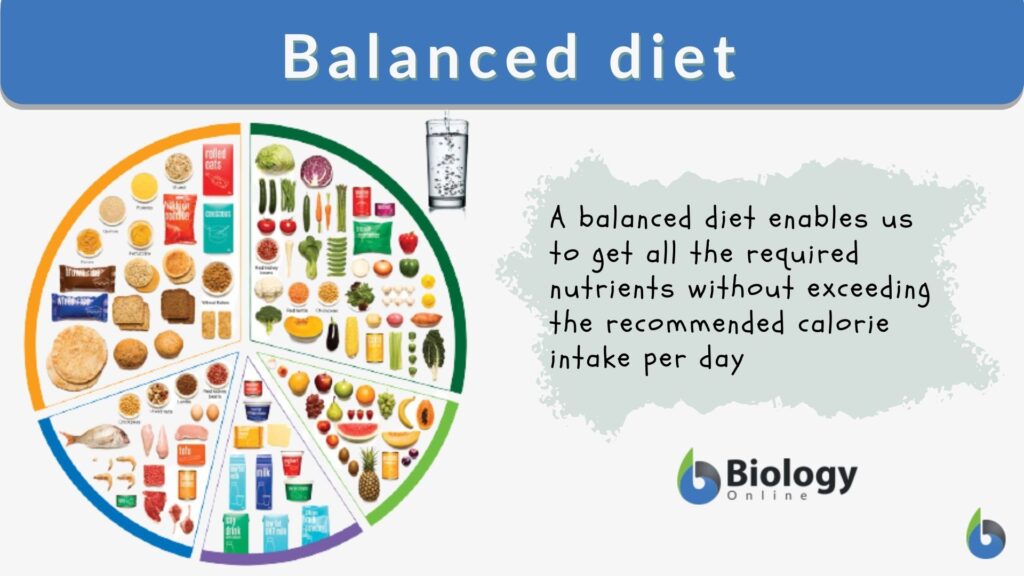
This image is property of www.biologyonline.com.
The role of physical activity in maintaining a balanced diet
The relationship between diet and exercise
Physical activity is an integral part of maintaining a balanced diet and overall health. Regular exercise helps regulate metabolism, manage weight, reduce the risk of chronic diseases, improve sleep, boost mood, and enhance overall well-being.
The importance of incorporating physical activity into your routine
To incorporate physical activity into your routine, you can:
- Engage in at least 150 minutes of moderate-intensity aerobic activity or 75 minutes of vigorous-intensity aerobic activity per week.
- Include resistance training exercises at least twice a week to build and maintain muscle mass.
- Find activities you enjoy, such as walking, cycling, swimming, or dancing, to make exercise more enjoyable and sustainable.
- Break up sedentary time by standing, stretching, or taking short walks throughout the day.
- Listen to your body and start with activities that are appropriate for your fitness level and abilities.
Conclusion
In conclusion, maintaining a balanced diet is essential for improving overall health and well-being. By understanding the fundamentals of a balanced diet, such as the importance of macronutrients, vitamins, and minerals, portion control, hydration, and avoiding processed foods, you can make informed food choices and improve your overall health.
To maintain a balanced diet, incorporate a variety of fruits and vegetables, lean proteins, whole grains, and healthy fats into your meals. Plan and prepare meals in advance, stay hydrated, and engage in regular physical activity. By making these changes, you can enhance your quality of life and promote long-term health and well-being. So, make a commitment to yourself and prioritize a balanced diet in your everyday life.
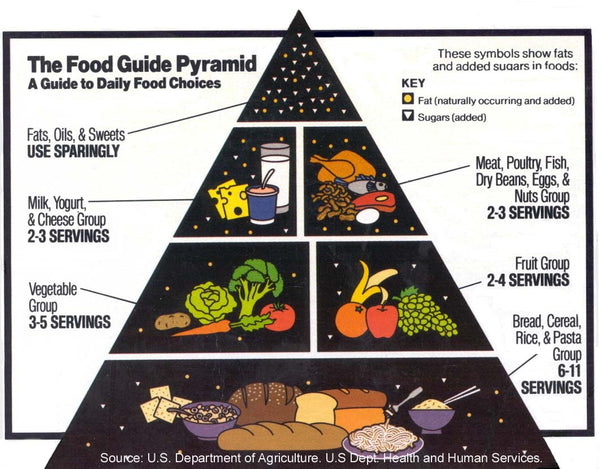
This image is property of cdn.shopify.com.

